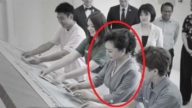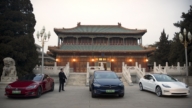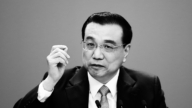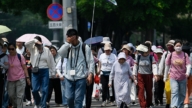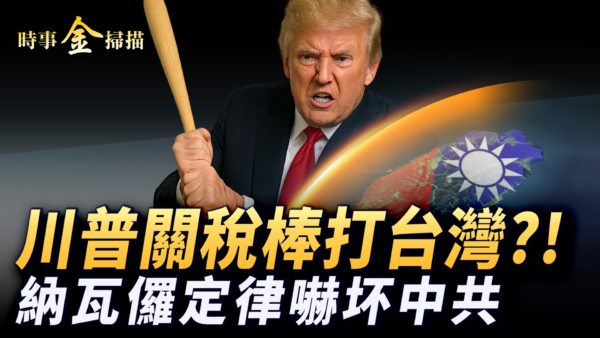【新唐人2012年12月05日讯】“十八大”前就传出,中共会将27个国务院部委缩减到18个大部委,日前《京华时报》和各媒体报导,“十八大”闭幕后,中共当局便着手就政府机构改革方案征集各界人士的意见。那么,这一动作是为了减少行政费用,还是在内斗中消减对手势力?而这种被称为关在“中共笼子里的改革”,能给中国带来实质变化吗?真正要改的话,会遇到什么样的阻力?接下来,就来听听民众的心声。
据《京华时报》11月29号报导,中共“十八大”闭幕后,当局便着手就“政府机构改革方案”征集各界人士的意见。根据这项方案,中共政权下属27个部门将缩减到18个,17个直属机构将缩减到6个。另外,原属于政府组成部门的“人民银行”将改为独立机构;而国家安全部降为国家安全总局;政府下属的官方通讯社—-《新华社》将实行企业制度改革。
旅美中国民运人士蔡桂华指出,中共历史上每次所谓的“精兵简政”,结果都比原来的规模更加扩大,导致机构更加臃肿。
蔡桂华:“装模作样的做给大家看看,第一是做做样子,树立亲政廉政的形象,它缩一缩、扩一扩,里面都有猫腻和蹊跷,大家在里面可以打压一批,甩掉一批,自己需要的时候再拉一批,又变成扩大一批。中共搞这些东西历来像演戏一样,我们已经过来之人看的多了。”
蔡桂华认为,胡锦涛在“十八大”上已经给中国的改革定调,所谓“不走因循守旧的老路,也不走改旗易帜的邪路。”蔡桂华说,中共一切所谓的“改革”,就是为了中共政权的稳定。
蔡桂华:“改革、不改革,不是他要考虑的,最重要的是权力的稳定。作为维稳的手段,需要改的话,对老百姓更糟糕,不是改革成有利于老百姓的国富民强的方向,它是有利于官僚体制更进一步稳固,更进一步维稳的方向改,所以这种改革是更反动、更丑陋。”
北京时政观察人士华颇认为,“大部制”的改革意义不大。他说,国务院系统调整之后,地方政府的部门也会做出相应的调整,把部委减少,让“协会”承担,可是“协会”也同样是政府的事业单位,也是需要用国家的税收来养。
北京时政观察人士华颇:“减少多龙治水,但也生出另一些问题。就是权力的垄断,给当权者以更好的权力输出的空间,而且人员也未必减少,有可能还会增加。而地方政府吃官饭、吃官粮,老百姓养的人数不少反增。”
华颇表示,中共各利益集团之间的关系旁根错节,谁也不能轻易撼动。他说,当年改革高速公路收费的问题,就是一个很好的例子。
华颇:“只要它是动了一些人的乳酪蛋糕的话,必然就会失败。有个例子,就是高速公路收费的问题,但是现在高速公路的收费一直不能停止,二级公路收费都是换汤不换药,以各种名目,吃、拿、卡、要,一收费还养了一些人,队伍越大越需要罚款收入,如果罚款收入越多,这队伍就要越大,形成恶性循环。”
华颇还指出,中共现在还在到处打压,不允许老百姓说话,不允许媒体自由报导,不允许民间成立社团和党派,中共高呼“改革”,只能是骗人的幌子。蔡桂华说,中共如果有诚意改革,应该向蒋经国学习—-开放党禁、报禁,落实民主选举。
采访编辑/刘惠 后制/君卓
People Not Optimistic on CCP’s Ministry-Level Reform
Rumor spread even before the 18th Congress that the CCP
(Chinese Communist Party) will cut the 27 ministries to 18.
Recently Jinghua News and other media reported,
that after the closing of the 18th Congress,
the CCP authorities have started to collect opinions
from all walks of life on reform of government institutions.
Is the goal of this action to reduce administrative costs,
or reduce opponents forces?
Will this so-called “cage reform"
bring real change to China?
What kind of resistance will it encounter?
Let’s listen to the voices of the people.
According to Jinghua News’ report from November 29,
after its 18th Congress, CCP is working on a new proposal.
The CCP authorities started collecting opinions from all
walks of live on Government Institutional Reform Proposal.
In this proposal, the 27 ministries will be reduced to 18,
17 direct subordinate agencies will be reduced to 6,
government’s People’s Bank will be changed
to become an independent business,
Ministry of National Security will be demoted
to Department of National Security,
and government news agency Xinhua
will implement an enterprise-wide reform.
Cai Guihua, U.S.’ residing Chinese pro-democracy activists,
pointed out that CCP’s so-called “streamlining” in the past always resulted in an even larger government.
Cai Guihua: “It tries to establish a false look of kindness.
There are tricks each time it shrinks or expands.
When it suppresses its opponents on the inside, it shrinks.
When it needs more resources, it expands.
We have seen many times
this type of acting by the CCP.”
Cai Guihuan thinks Hu Jintao has set the tone of a reform
during the 18th CCP’ Congress.
There he said, “Do not take the old-fashioned path,
nor the evil path that changes our flag.”
Cai Guihua suggests CCP’s so-called reform
is to strengthen its power.
Cai Guihua: “Reform or not reform is not what he considers.
What is the most important to him is stability of power.
In order to safeguard stability, the CCP will change
even if this is worse for the people.
The reform is not in favor of the people or the country,
it is beneficial to safeguard the bureaucracy system.
So such reform can only lead to a more reactionary,
and dreadful regime.”
Beijing observer Hua Po thinks the “Ministry-Level” reform
does not carry much significance.
He said that after the state-level system is adjusted,
local governments will be made to follow it.
The reduced ministry resources will be taken
by other organizations of the government.
Hua Po: “The reduction will bring other issues. Power
monopoly gives leaders more space to implement power.
The resources will not be reduced,
but rather increased.
Local government staff who consumes tax payers’ money
will also increase, instead of decreasing.”
Hua Po thinks CCP’s various interests groups,
are closely entangled.
No one can touch them at ease. He said,
the high-way toll reform before was a good example.
Hua Po: “As soon as the cheese case is touched, it will fall.
Like the high-way toll’ issue – the toll collection is still on.
Second-level road tolls changed their names,
but have not stopped.
There is a large group of people depending on the road tolls.
The larger the group is, the more fines and toll it needs;
the more fines and tolls there are,
the larger the group grows. This is a vicious cycle.”
Cai Guihua also states the CCP still carries on its suppression,
does not allow freedom of speech, free media, establishment of independent political organizations and parties.
CCP’s loud reform is only to deceive people.
If it is sincere about reform, CCP should lift the ban on
political parties and media, and allow democratic elections, concludes Cai Guihua.


